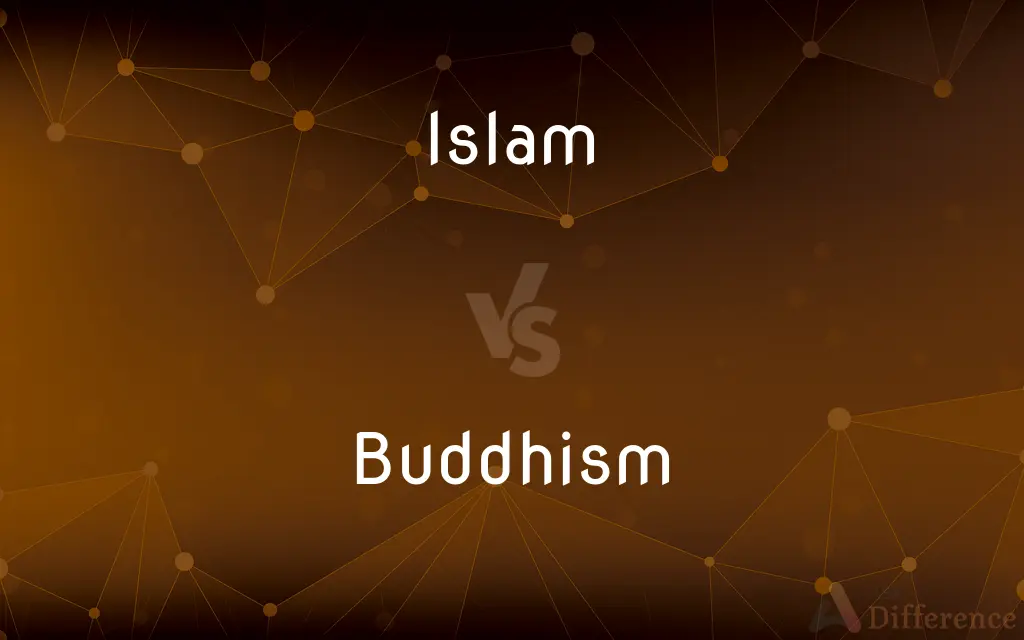Islam vs. Buddhism — What's the Difference?
By Tayyaba Rehman & Fiza Rafique — Updated on April 18, 2024
Islam is monotheistic religion based on teachings of Prophet Muhammad, emphasizing submission to one God, while Buddhism is non-theistic religion that focuses on personal spiritual development and attainment of deep insight into the true nature of life.

Difference Between Islam and Buddhism
Table of Contents
ADVERTISEMENT
Key Differences
Islam centers around the belief in one God (Allah) and follows the teachings of the Prophet Muhammad as recorded in the Quran, emphasizing obedience to God’s commandments. Whereas Buddhism, founded by Siddhartha Gautama (the Buddha), does not focus on the worship of deities but rather on individual spiritual awakening and the path to Enlightenment through ethical living, meditation, and understanding the nature of reality.
In Islam, the practice of faith includes five pillars: Shahada (faith), Salat (prayer), Zakat (charity), Sawm (fasting during Ramadan), and Hajj (pilgrimage to Mecca). On the other hand, Buddhism is built around the Four Noble Truths and the Eightfold Path, which guide followers toward the cessation of suffering and the achievement of Nirvana.
The concept of God in Islam is central, with Allah seen as the creator and sustainer of the universe, to whom worship and absolute obedience are due. Conversely, Buddhism is generally non-theistic and does not involve worship of a god or gods, focusing instead on personal spiritual growth and the quest to overcome suffering.
Islamic teachings emphasize the afterlife, where individuals are judged and then rewarded or punished based on their earthly actions. In contrast, Buddhism teaches the cycle of rebirth (samsara), which can only be escaped through attaining Enlightenment, leading to Nirvana, a state of liberation and freedom from suffering.
Cultural practices in Islam include specific dietary laws, daily prayer rituals, and the celebration of religious holidays such as Eid. Buddhism varies widely in practice between cultures but generally includes meditation, mindfulness practices, and observance of days significant to the Buddha's life.
ADVERTISEMENT
Comparison Chart
Core Beliefs
Monotheism, submission to Allah
Non-theistic, path to Enlightenment
Key Practices
Five Pillars: Prayer, Fasting, Charity
Four Noble Truths, Eightfold Path
Focus
Obedience to God, Afterlife
Personal spiritual growth, Nirvana
Scriptures
Quran
Tripitaka, various others
Philosophical Stance
Theistic
Non-theistic
Major Holidays
Eid, Ramadan
Vesak, Bodhi Day
Compare with Definitions
Islam
A monotheistic Abrahamic faith that believes in one God and follows the teachings of Muhammad as a prophet.
Muslims follow the Quran, which they believe is the literal word of God as revealed to Muhammad.
Buddhism
Focuses on meditation and mindfulness as means of achieving higher states of awareness.
Daily meditation is common among Buddhists to cultivate mental discipline and insight into the nature of existence.
Islam
Characterized by the practice of the Five Pillars.
Observant Muslims pray five times a day facing Mecca.
Buddhism
Encourages ethical living, compassion, and wisdom.
Buddhists practice compassion to all living beings, striving to relieve suffering wherever they find it.
Islam
Places significant emphasis on community, morality, and the law.
Islamic law, or Sharia, governs many aspects of a Muslim's daily life and community interactions.
Buddhism
Observes days significant to the life of the Buddha.
Vesak, the Buddha’s birthday, is an important day of joyous celebration in Buddhist communities around the world.
Islam
Celebrates significant religious events with community gatherings.
Eid al-Fitr marks the end of Ramadan, the holy month of fasting, with community prayers and festive meals.
Buddhism
A non-theistic religion that emphasizes personal enlightenment and the overcoming of suffering.
Buddhists follow the Eightfold Path to break the cycle of suffering associated with rebirth.
Islam
Promotes charity and concern for the needy.
Giving alms (Zakat) is a requirement for Muslims, serving as both a social welfare system and a method of redistributing wealth.
Buddhism
Adaptable to various cultures, leading to diverse practices and sects.
Zen Buddhism in Japan emphasizes meditation, while Tibetan Buddhism includes rituals and the worship of bodhisattvas.
Islam
Islam (; Arabic: اَلْإِسْلَامُ, romanized: al-’Islām, [ɪsˈlaːm] (listen) "submission [to God]") is an Abrahamic monotheistic religion teaching that Muhammad is a messenger of God. It is the world's second-largest religion with 1.9 billion followers, or 24.9% of the world's population, known as Muslims.
Buddhism
Buddhism (, US: ) is an Indian religion based on a series of original teachings attributed to Gautama Buddha. It originated in ancient India as a Sramana tradition sometime between the 6th and 4th centuries BCE, spreading through much of Asia.
Islam
A monotheistic religion characterized by the doctrine of absolute submission to God and by reverence for Muhammad as the chief and last prophet of God.
Buddhism
A widespread Asian religion or philosophy, founded by Siddartha Gautama in north-eastern India in the 5th century BC.
Islam
The people or nations that practice Islam; the Muslim world.
Buddhism
The teaching of Siddhartha Gautama that life is permeated with suffering caused by desire, that suffering ceases when desire ceases, and that enlightenment obtained through right conduct, wisdom, and meditation releases one from desire, suffering, and rebirth.
Islam
The civilization developed by the Muslim world.
Buddhism
The religion represented by the many groups, especially numerous in Asia, that profess varying forms of this doctrine and that venerate Siddhartha Gautama.
Islam
The religion of the Mohammedans; Mohammedanism; Islamism. Their formula of faith is: There is no God but Allah, and Mohammed is his prophet.
Buddhism
The religion based upon the doctrine originally taught by the Hindu sage Gautama Siddartha, surnamed Buddha, "the awakened or enlightened," in the sixth century b. c., and adopted as a religion by the greater part of the inhabitants of Central and Eastern Asia and the Indian Islands. Buddha's teaching is believed to have been atheistic; yet it was characterized by elevated humanity and morality. It presents release from existence (a beatific enfranchisement, Nirvâna) as the greatest good. Buddhists believe in transmigration of souls through all phases and forms of life. Their number was estimated in 1881 at 470,000,000.
Islam
The whole body of Mohammedans, or the countries which they occupy.
Buddhism
A religion represented by the many groups (especially in Asia) that profess various forms of the Buddhist doctrine and that venerate Buddha
Islam
The religion of Muslims collectively which governs their civilization and way of life; the predominant religion of northern Africa, the Middle East, Pakistan and Indonesia
Buddhism
The teaching of Buddha that life is permeated with suffering caused by desire, that suffering ceases when desire ceases, and that enlightenment obtained through right conduct and wisdom and meditation releases one from desire and suffering and rebirth
Islam
The monotheistic religion of Muslims founded in Arabia in the 7th century and based on the teachings of Muhammad as laid down in the Koran;
The term Muhammadanism is offensive to Muslims who believe that Allah, not Muhammad, founded their religion
Common Curiosities
Can Buddhism and Islam coexist in the same cultural contexts?
Yes, Buddhism and Islam can and do coexist in various parts of the world, though their core beliefs and practices differ significantly.
How do Muslims view the afterlife?
Muslims believe in a definitive afterlife where individuals are judged by Allah and rewarded with paradise or punished with hell based on their life’s deeds.
What does Buddhism emphasize in its teachings?
Buddhism emphasizes personal spiritual growth, the practice of meditation, ethical living, and the attainment of Enlightenment.
What is the ultimate goal of Buddhism?
The ultimate goal of Buddhism is to achieve Nirvana, which is the liberation from the cycle of rebirth and suffering.
How do Islam and Buddhism address the concept of suffering?
Islam acknowledges suffering as a part of human life, often viewed as a test from God; enduring suffering with patience is seen as meritorious and a means to erase sins. Buddhism centers its teachings around the concept of suffering, identifying its causes, and offering a path (the Eightfold Path) to alleviate and ultimately end suffering through Enlightenment.
What is the role of rituals in both religions?
In Islam, rituals such as the daily prayers, fasting during Ramadan, and the pilgrimage to Mecca are central to religious life and are seen as expressions of devotion to God. In Buddhism, rituals can vary widely but often include chanting, meditation, and monastic rituals, serving as methods to cultivate discipline, mindfulness, and spiritual awareness.
How do prayer practices differ between Islam and Buddhism?
In Islam, prayer (Salat) is a formal, structured activity performed five times a day facing Mecca, involving specific physical postures and recitations. In Buddhism, prayer may involve meditation, chanting, or mindfulness practices, focusing on personal enlightenment and mental clarity rather than formalized worship.
How is spiritual progress achieved in Islam and Buddhism?
In Islam, spiritual progress is achieved through obedience to Allah’s commandments, regular prayer, fasting, charity, and pilgrimage, which deepen one's faith and piety. In Buddhism, spiritual progress is achieved through meditation, understanding and applying the teachings of the Buddha, and ethical living, aiming to attain deeper insight and ultimately Enlightenment.
What are the views on violence and peace in both religions?
Islam teaches peace but also allows self-defense and, under strict conditions, warfare in defense of faith and community. However, the overall emphasis is on peace and justice. Buddhism generally promotes non-violence (ahimsa) as a core principle, advocating for peace and the resolution of conflict through compassion and understanding.
What is the significance of religious leaders in both religions?
In Islam, religious leaders such as imams and scholars play important roles in interpreting the Quran and Hadith, leading prayers and providing spiritual guidance. In Buddhism, monks and nuns, as well as lay teachers, guide practitioners in meditation and ethical living, although they do not serve as intermediaries between the individual and divinity as in Islam.
What is the central belief of Islam?
The central belief of Islam is the worship of one God, Allah, and following the teachings of the Prophet Muhammad.
What roles do scriptures play in Islam and Buddhism?
In Islam, the Quran is the central religious text, considered the literal word of God as revealed to Muhammad, and it is followed explicitly. Buddhism relies on a variety of texts, the most important being the Tripitaka, which records the Buddha’s sayings, but interpretations and emphasis can vary widely among different Buddhist traditions.
How do the concepts of charity and community service compare in Islam and Buddhism?
In Islam, charity is a fundamental aspect of faith, required as one of the Five Pillars (Zakat), and is directed towards helping those in need within the community. In Buddhism, while not mandated as a formal requirement, acts of generosity (dana) are highly encouraged as they cultivate detachment from materialism and benefit the community.
How do each of these religions view other religious traditions?
Islam recognizes the validity of earlier Abrahamic religions (Christianity and Judaism) as sharing a common heritage but sees itself as the final and most complete revelation. Buddhism typically exhibits a more inclusive attitude, viewing all religions as potential paths to spiritual wisdom, although it emphasizes its own path to Enlightenment as unique and effective.
Are there dietary restrictions associated with Islam and Buddhism?
Islam has specific dietary laws, including prohibitions against consuming alcohol and pork, and mandates halal slaughtering practices. Buddhism generally promotes vegetarianism or a diet that minimizes harm to living beings, although not all Buddhists are vegetarians, and practices can vary.
Share Your Discovery

Previous Comparison
Motorcyclist vs. Biker
Next Comparison
Needlepoint vs. EmbroideryAuthor Spotlight
Written by
Tayyaba RehmanTayyaba Rehman is a distinguished writer, currently serving as a primary contributor to askdifference.com. As a researcher in semantics and etymology, Tayyaba's passion for the complexity of languages and their distinctions has found a perfect home on the platform. Tayyaba delves into the intricacies of language, distinguishing between commonly confused words and phrases, thereby providing clarity for readers worldwide.
Co-written by
Fiza RafiqueFiza Rafique is a skilled content writer at AskDifference.com, where she meticulously refines and enhances written pieces. Drawing from her vast editorial expertise, Fiza ensures clarity, accuracy, and precision in every article. Passionate about language, she continually seeks to elevate the quality of content for readers worldwide.
















































